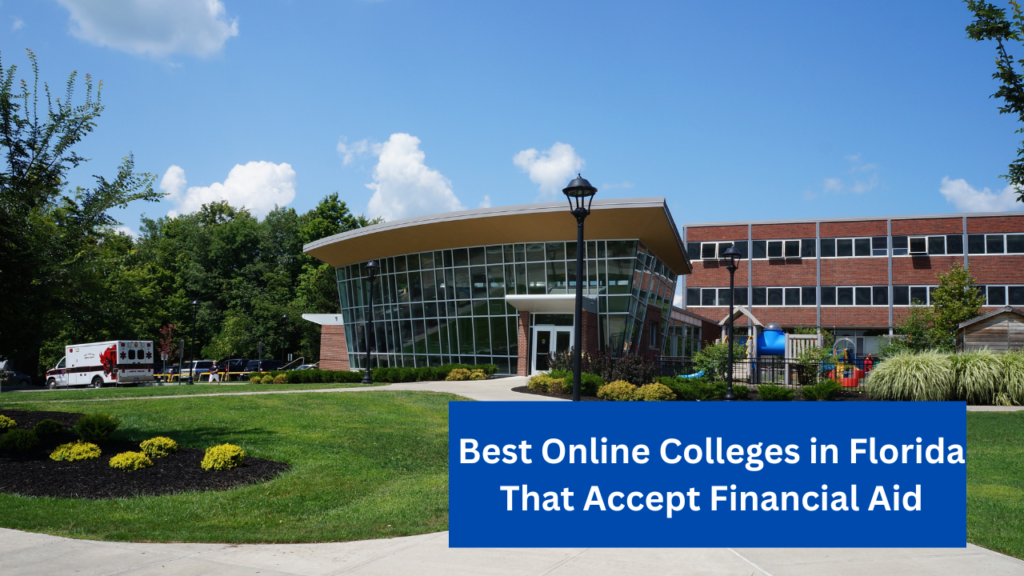Looking for the best online colleges in Florida that accept financial aid? Discover accredited, top-rated programs that offer flexible, affordable, quality education with full financial support.
In 2025, Florida’s online education landscape is booming, with more than 430,000 students enrolled across its 12 public universities and numerous private colleges (State University System of Florida). Florida’s best online colleges that accept financial aid offer a gateway to affordable and flexible degrees, supported by federal, state, and institutional aid such as Pell Grants and the Florida Bright Futures Scholarship. With an average in-state tuition of $4,540 at public universities, well below the national $9,750 (NCES 2022-2023), these programs facilitate access to higher education. From nursing to cybersecurity, these degrees align with Florida’s thriving job market, with projected annual growth of 2.6% (Florida Governor’s Office).
Florida offers a wide variety of online colleges that accept financial aid, making higher education more accessible and affordable for students across the state. Whether you’re pursuing a degree remotely or combining work and study, many accredited institutions in Florida offer robust financial aid options, including federal, state, and institutional support.
Top Online Colleges in Florida That Accept Financial Aid

University of Florida Online (UF Online)
UF Online offers a wide range of undergraduate programs with the same academic rigor as their on-campus counterparts. Online students can access federal, state, and institutional financial aid, administered by the Office of Student Financial Aid and Scholarships (SFA).
University of Central Florida (UCF Online)
UCF Online offers a variety of undergraduate and graduate programs. Online students have access to financial aid similar to on-campus students, including federal and state aid, as well as scholarships. The Office of Student Financial Aid offers resources and guidance to help students apply for financial aid.
University of West Florida (UWF Online)
UWF Online offers affordable education with competitive tuition and financial aid opportunities. The university works with students to facilitate access to education and offers robust support resources to help them succeed in their online programs.
Seminole State College of Florida
Seminole State College offers a variety of online degrees and certificates. Online students have access to admissions, advising, testing, financial aid, registration, tutoring, and library support, ensuring a well-rounded educational experience.
Florida College
Florida College offers online programs and accepts federal financial aid. Students must submit the Free Application for Federal Student Aid (FAFSA) annually to be considered for grants, scholarships, student loans, or federal work-study funds.
University of South Florida (USF) Online (www.usf.edu)
Eligible for federal aid and Bright Futures through the FAFSA. Offers Golden Promise (full tuition for low-income Miami-Dade residents) and $7 million in scholarships (www.fiuonline.fiu.edu). It offers business, cybersecurity, and public health programs. Its popular logistics degree supports Florida’s port industry. Tuition: $229 per credit (in-state).
Popular Online Degrees in Florida
The best online colleges in Florida that accept financial aid offer degrees tailored to Florida’s economic growth, where healthcare and tourism drive demand. These programs prepare students for high-paying positions. Below are the most popular online degrees in 2025. Each aligns with industry trends and aid eligibility.
Nursing (RN to BSN): Offered by UF, USF, and FSU, with a 95% job placement rate. Nurses earn an average of $79,560, with a projected job growth of 29% (BLS 2025).
Business Administration: UCF and FIU programs support Florida’s 42,800 new private-sector jobs (2023), with MBAs earning over $90,000 (Payscale).
Cybersecurity: FIU and USF degrees fill the demand for more than 3,000 cybersecurity jobs annually in Florida, with average salaries of $85,000 (Cyberseek 2025).
Hospitality Management: FSU and UCF programs integrate with Florida’s $111 billion tourism industry and offer positions at Disney and Marriott (Visit Florida).
Public Health: USF’s top-ranked program trains professionals for Florida’s healthcare sector, with salaries starting at $50,000 (www.usf.edu).
Steps to Apply for Financial Aid
Applying for financial aid at the best online colleges in Florida that accept financial aid is simple, but it requires preparation. Follow these steps to secure your funding in 2025. Understand the pros and cons to make informed decisions. Applying early maximizes your aid opportunities.
Complete the FAFSA:
Submit the Free Application for Federal Student Aid at www.fafsa.gov (available November 18, 2024, to June 30, 2026). Include the institution codes (e.g., UF: 001535, UCF: 003954).
Requirements: Social Security number, tax return, bank statements, and parental information (if you are under 24).
Apply for state and institutional aid:
Bright Futures requires the FAFSA and a Florida Application for Financial Aid by August 31, 2025 (www.floridastudentfinancialaid.org).
Submit scholarship applications through university portals (e.g., the USF Scholarship Matrix, www.usf.edu).
Review the Student Aid Report (SAR):
Review the SAR for errors within a few days of submitting the FAFSA. Update it through www.fafsa.gov, according to www.usnews.com.
Compare Award Letters:
Universities send offers detailing grants, loans, and scholarships. Use net price calculators (e.g., www.ufl.edu) to estimate costs after aid.
Accept Aid:
Accept grants and scholarships first, and then loans if necessary, through university portals. Complete loan counseling and the Master Promissory Note (www.fafsa.gov).
Types of Financial Aid Accepted
Navigating the financial aid landscape can be overwhelming, but understanding the different types of aid available can help students make informed decisions about financing their education. Colleges accept various forms of financial aid, including scholarships, grants, loans, and work-study programs.
Scholarships
Scholarships are financial aid that does not require repayment. They are typically based on merit, need, or awarded for specific talents, achievements, or demographic characteristics. The most common types include:
- Academic scholarships for high-achieving students.
- Athletic scholarships for student-athletes.
- Identity-based scholarships for underrepresented groups.
- Private scholarships from organizations and foundations.
Grants
Grants are need-based financial aid that also does not require repayment. They are typically awarded by federal and state governments, as well as by private colleges and universities. Some examples include:
- Federal Pell Grants for low-income students.
- State scholarships for residents attending state universities.
- Institutional scholarships offered by universities based on financial need.
Federal Student Loans
Loans must be repaid, but federal student loans offer lower interest rates and flexible repayment options. The most common types include:
- Subsidized loans, where the government covers the interest while the student is in school.
- Unsubsidized loans, where interest accrues from the outset.
- PLUS loans, available to parents and graduate students.
Work-Study Programs
The Federal Work-Study Program offers part-time employment to students with financial need, allowing them to earn money to cover their educational expenses.
Private Student Loans
Banks and lenders offer private loans, often with higher interest rates and fewer repayment protections than federal loans.
Military Financial Aid
Programs like the GI Bill provide tuition assistance to veterans and active-duty service members.
Employer Tuition Assistance
Some employers offer reimbursement or tuition assistance programs to employees pursuing higher education.
Crowdfunding and Community Support
Students can seek financial aid through crowdfunding platforms or community scholarships.
Knowing these financial aid options can help students maximize their funding opportunities and reduce the burden of tuition costs.
FAQs About Best Online Colleges In Florida That Accepts Financial Aid in 2025
Which online colleges in Florida accept financial aid in 2025?
The best online colleges in Florida that accept financial aid are UF, UCF, FSU, FIU, and USF. All accept the FAFSA for federal and state aid, according to www.fafsa.gov.
What types of financial aid are available for online students in Florida?
There is federal aid (Pell Grants, loans), state programs (Bright Futures, FSAG), and institutional grants (e.g., UF’s Machen Scholarships), according to www.floridastudentfinancialaid.org.
How do I apply for financial aid at these colleges?
File the FAFSA at www.fafsa.gov by April 30, 2025, and apply for state/institutional aid through the college portals (e.g., www.ucf.edu). Submit your transcript and essays, if necessary.
What are the most popular online degrees in Florida?
Nursing, business administration, cybersecurity, hospitality, and public health are the most popular options, in line with Florida’s healthcare and tourism sectors, according to www.bestcolleges.com.
Are online degrees from these universities respected by employers?
Yes, SACSCOC-accredited degrees from UF, UCF, and other universities are valued, especially in Florida’s healthcare and technology sectors, according to www.forbes.com.
Conclusion
Florida offers a broad range of high-quality online colleges that accept financial aid. From prestigious public universities like UF and FSU to affordable community colleges and private institutions, students have many options. The key to success is choosing an accredited institution, understanding your aid eligibility, and applying early. additional resources


